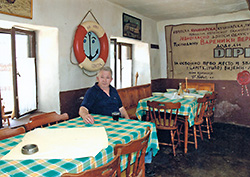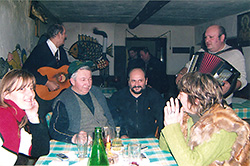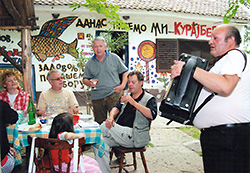Farewell
LAST DAY IN THE CSARDA ”AT THE END OF THE WORLD”
There’s No End, just Moving
It stood there for more than half a century, at the Danube branch, at the edge of the Kovilj marsh. It was an important point of the local mythology of Belgrade and Novi Sad, gathering place of poets and bohemians, lovers of the river and the plain. Then, all of a sudden, the owner of the land decided to cancel the Csarda this May. The ”Golden Apple” TV show gathered us to tell the most important story about this place. If they close it here, we’ll move the end of the world to a different place. But the Csarda will survive everything, even us, such as we are
By: Goran Budimir
 There’s a csarda in Kovilj. There’s a csarda in Kovilj.
They call it ”At the End of the World”.
Bohemians gave it its name
when they came one summer day.
There was always food and drinks,
songs and joy,
and no one minded
that the csarda is at the end of the world.
The csarda is small, almost unnoticeable, hidden behind mulberry trees, covered with sedges and reeds. Placed in the middle of the Pannonian Plain, on the edge of the Danube branch and in the vicinity of the Kovilj Monastery, it used to greet its guests, intoxicated them with good wine and saw them off with melancholic songs. And so it was, they say, from the old times. Ever since late Pera Varenika cooked his first stew and immediately after opened a csarda by this bog. Today it’s hard to imagine all the people that used to come here, rest under the eaves, recite verses learnt by heart, leave their signs on walls. And they say there were many. From painters, poets and other artists, to ambassadors, businessmen and parliament members. There were joyful and sad ones, those in love and those lovesick, cheerful and heavyhearted, but all of them could relax at least for a moment and find relief from everyday stress here.
MUDDY STREET AT THE END OF THE WORLD
 – When I learnt fishing, my uncle brought me here for the first time – tells us Bane Krstić from ”Garavi Sokak” (”Muddy Street”) this spring. – It was a long time ago, in the seventies, I was fourteen. This is where I first learnt to use bamboo sticks, much thicker than the ones used today. Then I met Janika Balaša, who was there, across, near the other bank. He was a great fisherman... – When I learnt fishing, my uncle brought me here for the first time – tells us Bane Krstić from ”Garavi Sokak” (”Muddy Street”) this spring. – It was a long time ago, in the seventies, I was fourteen. This is where I first learnt to use bamboo sticks, much thicker than the ones used today. Then I met Janika Balaša, who was there, across, near the other bank. He was a great fisherman...
Only many years later, says Bane Krstić, he understood why Janika Balaš came here:
– I realized that this place is called At the End of the World. Since it’s at the end of the world, it is practically beyond the world. And if it’s beyond the world, it is also beyond time. As if being in the heart of a hurricane, here you’d become untouchable for the cruelties of the world and time, you’d find the mysterious point of peace and in it your own self. That point, simple, romantic, poetic, had a recuperating power.
 Attracted by the original beauty, wild marshes, tireless fishermen and fresh fish that arrived every day, especially by the scent of the stew the present owner Đorđe Varenika has been preparing for years the same way his late father did, many guests came here. Attracted by the original beauty, wild marshes, tireless fishermen and fresh fish that arrived every day, especially by the scent of the stew the present owner Đorđe Varenika has been preparing for years the same way his late father did, many guests came here.
– The water, forest and nature provoke desire for a good fish stew in anyone who comes here – says Đorđe Varenika. – Old fishermen used to say: if it’s cooked outside, in the open, which is what they did, the stew is better. During cooking, it receives oxygen and gets a unique taste. I’m not sure this is really true, but that is what the old Danube fishermen tell. My guests often say: ‘Uncle Đole, we can stop at any place in this road, but we love coming to you. Your stew is always the same, excellent.’ I shrug and smile, what can I say. It’s simple. I know the recipe, I cook from experience, and always bring a good emotion in my cooking. They feel it, love it, it’s good for them. Anyone who comes here is of the opinion that my stew is good.
 This csarda not only remained beyond time, but also beyond other benefits of civilization. It was never connected to the waterworks, never had electricity or phone line. Roads never passed near it, but guests would always find it. However, they don’t come here only for the stew, wine, nature and music. This csarda has become famous for its visitors, people of great spirit and broad views, artistic giants who have woven their unique charm and contributed to the atmosphere to remember and talk about. This csarda not only remained beyond time, but also beyond other benefits of civilization. It was never connected to the waterworks, never had electricity or phone line. Roads never passed near it, but guests would always find it. However, they don’t come here only for the stew, wine, nature and music. This csarda has become famous for its visitors, people of great spirit and broad views, artistic giants who have woven their unique charm and contributed to the atmosphere to remember and talk about.
ONLY THE STORY WILL REMAIN
– The csarda ”At the End of the World” is one of the important common places of the local mythology of Belgrade and Novi Sad, Serbian capital and Serbian Athens. Seemingly lost in the endless plain, at the edge of the big river, this place gathered us easier than the centers of the cities we live in. Here, without electricity and music in the toilet, we rejected stupid mystifications of this civilization of banal spectacles, we became simpler and more intimate, closer to our own selves and dear people around us – says Bane  Matić. – The csarda ”At the End of the World” is one of the precious places on earth from which fools and demons were chased out with laughter and tamburitza music. This is the place where we loved this plain most, and where it loved us. Only here I could hear Laza Kostić the right way, born in the nearby Kovilj. Only here I understood Mika Antić and his poetic ”land of farms, glasses and landless ones”. Only here I comprehended the letters Crnjanski wrote to Andrić from his village, misplaced somewhere in Banat. Here I associated with Momo Kapor and Milorad Pavić, with Vasko Popa and Brana Petrović, this is where Dragoš Kalajić gathered his friends for the last time. This is where I realized once again that everything will pass away, only the story will remain. Matić. – The csarda ”At the End of the World” is one of the precious places on earth from which fools and demons were chased out with laughter and tamburitza music. This is the place where we loved this plain most, and where it loved us. Only here I could hear Laza Kostić the right way, born in the nearby Kovilj. Only here I understood Mika Antić and his poetic ”land of farms, glasses and landless ones”. Only here I comprehended the letters Crnjanski wrote to Andrić from his village, misplaced somewhere in Banat. Here I associated with Momo Kapor and Milorad Pavić, with Vasko Popa and Brana Petrović, this is where Dragoš Kalajić gathered his friends for the last time. This is where I realized once again that everything will pass away, only the story will remain.
Immediately guitars and songs enter the story. The other Bane, Krstić, sings us one of his authentic Danube songs, created here, At the End of the World: ”Those two eyes of yours, two small almonds, that God sent me to chase away evil spells, feel asleep tonight on my shoulder... Like two pearls in the net of fishermen, they will dream the song of waves tonight, like our secret will dream the roaring of deer in the Danube forests...” Yes, ”flow, flow Danube, but don’t tell anyone, I’d give everything... everything for her, but don’t tell anyone...”
 The music silences for a moment and Nebojša continues the story of two Banes. Nebojša Jevrić. The music silences for a moment and Nebojša continues the story of two Banes. Nebojša Jevrić.
– Everyone came here. Everyone who liked kafanas and knew the bohemian life of Belgrade and Novi Sad came here to meet, to have a drink together, hear a good story. Where are we going to hear good stories now? Where are all those places taken away from us? Places which used to be our unusual free universities? Here we are, in the csarda ”At the End of the World”, and at the end of a hundred and twenty years old story. A story about Serbian artistic bohemia, of Belgrade and Novi Sad, which, strangely, ends right here.
Then Đole Varenika sings us the song from the beginning and the end, showing that he is not only a fish stew master. Everyone sings with him, loudly, in the csarda ”lost somewhere in the plain”, in the deep night. Candles are burning down, guests are getting ready to leave. For the first time, the csarda isn’t seeing them off, they are seeing it off. There is still some hope. Bane Matić:
– I don’t dispute anyone’s right to dispose with his property as he wishes. But the csarda ”At the End of the World” cannot be canceled. It’s not made of walls and tables, it’s made of people. It’s not a matter of cadastre, it’s a matter of spirit. If they close it here, we’ll move the end of the world to another place. But the Csarda will outlive everything, even us, such as we are.
***
If this dies too...
Mišo Vujović says that the csarda ”At the End of the World” is not the last resort of bohemians, but the ”last resort of the soul”.
– This is where we used to, as the song goes, run from wives, from problems, from ourselves, from the world. Here we associated, truly, purely, as we did in the old times. People who created this beautiful spot in Bačka have left us a long time ago. When this spot dies, as many kafanas of bohemian Belgrade died, now turned into some boutiques and betting places, soulless places, a part of the spirit of an era will die as well...
***
Story in a Poem
Đorđe Varenika: ”Real bohemians dropped by here and didn’t go further. They’d present their soul, imagination and their thoughts. They raised glasses and greeted mornings with singing, no one cared what tomorrow would bring. Many have met the love of their life here. And the ‘secret of love joy is kept by white water lilies’. Our fathers and grandfathers used to eat here; many were escorted late at night by tamburitzas and accordions. Then, when the music dies and the plain goes to sleep, the blue dawn hugs the beauty at the end of the world...”
|
